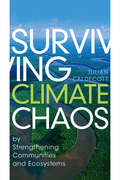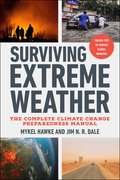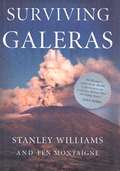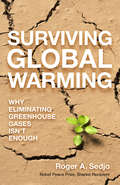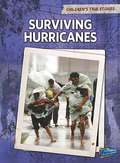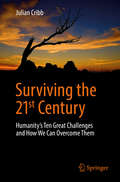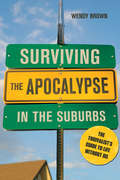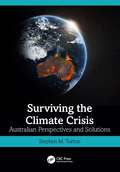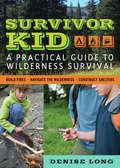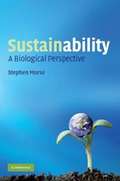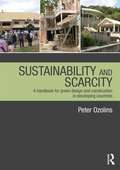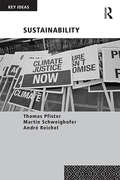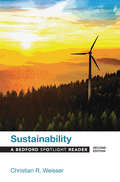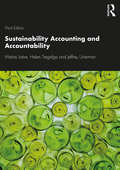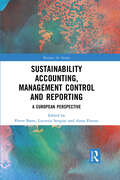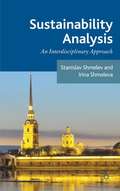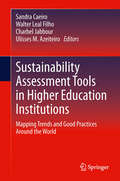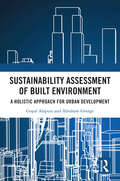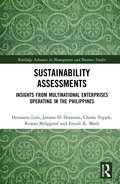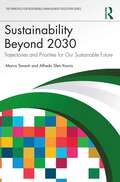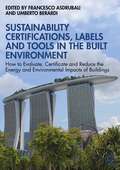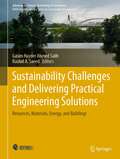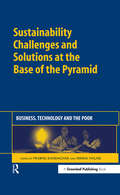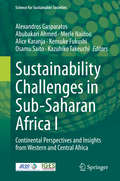- Table View
- List View
Surviving Climate Chaos: by Strengthening Communities and Ecosystems
by Julian CaldecottSurviving climate chaos needs communities and ecosystems able to cope with near-random impacts. Their strength depends upon their integrity, so preserving and restoring this is essential. Total climate breakdown might be postponed by extreme efforts to conserve carbon and recapture pollutants, but climate chaos everywhere is now inevitable. Adaptation efforts by Paris Agreement countries are converging on community-based and ecosystem-based strategies, and case studies in Bolivia, Nepal and Tanzania confirm that these are the best ways forward. But success depends on local empowerment through forums, ecosystem tenure security and environmental education. When replicated, networked and shielded by governments, they can strengthen societies against climate chaos while achieving sustainable development. These vital messages are highlighted for all those who seek or have already found a role in promoting adaptation: for students, researchers and teachers, government officials and aid professionals, and for everyone who is now living under threat of climate chaos.
Surviving Extreme Weather: The Complete Climate Change Preparedness Manual
by Mykel Hawke Jim N.R. DaleThe only guide you need to prepare for the dangerous effects of climate change. The world has changed, and impacts of global warming means weather events like extreme heat, wildfires, hurricanes, and droughts are now being felt by all of us. We can ignore climate change no longer and must prepare ourselves to survive in new conditions. The key to surviving extreme weather events is to understand them from a practical perspective and then plan and execute tactical responses. In Surviving Extreme Weather, Mykel Hawke, a renowned survivalist and bestselling author of Hawke&’s Special Forces Survival Handbook and Hawke&’s Green Beret Survival Manual, and British meteorologist Jim N. R. Dale, share their expert knowledge and personal experiences while offering valuable insights into the science behind our new weather and how to apply situational awareness, preparedness, and psychology to survive.Surviving Extreme Weather: The Complete Climate Change Preparedness Manual is categorized by elements—fire, water, wind, and earth—events are explained with recommendations anyone can follow to protect themselves and their family, and to minimize the risks of damage to life and property. Included are lists of items every person, home, business, and vehicle should always stock, such as: first aid kits, afflictions, and applications; emerging technologies to help protect against different weather phenomena; structural and landscape precautions and improvements; philosophies to help family, friends, and neighbors get through any environmental ordeal.
Surviving Galeras
by Stanley Williams Fen MontaigneThis true, up-close account of a volcano&’s eruption &“artfully blends science writing and history with pure, heart-pounding action&” (Mark Bowden, bestselling author of Black Hawk Down). In 1993, Stanley Williams, an eminent volcanologist, was standing on top of a Colombian volcano called Galeras when it erupted, killing six of his colleagues instantly. As Williams tried to escape the blast, he was pelted with white-hot projectiles traveling faster than bullets. Within seconds he was cut down, his skull fractured, his right leg almost severed, his backpack aflame. Williams lay helpless and near death on Galeras&’s flank until two brave women—friends and fellow volcanologists—mounted an astonishing rescue effort to carry him safely off the mountain. Surviving Galeras is both a harrowing first-person account of an eruption and its aftermath, and a look at the fascinating, high-risk world of volcanology, exploring the profound impact volcanoes have had on the earth&’s landscapes and civilizations. Even with improved, highly-sensitive measuring tools and protective equipment, at least one volcanologist, on average, dies each year. This book reveals how Williams and his fellow scientist-adventurers continue to unveil the enigmatic and miraculous workings of volcanoes and piece together methods to predict their actions—potentially saving many human lives. &“I thoroughly enjoyed this excellent book . . . [A] riveting story.&” —Dava Sobel, author of The Glass Universe &“Popular science at its best.&” —The New York Times &“[A] page-turner.&” —Booklist
Surviving Global Warming: Why Eliminating Greenhouse Gases Isn't Enough
by Roger A. SedjoThis provocative and important overview of the challenges of and possible approaches to climate change by an expert and shared recipient of a Nobel Peace Prize is essential reading for policy makers, climate scientists, and lay persons alike.Though the Paris Agreement on climate change was a significant achievement, most authorities agree that its measures to reduce greenhouse-gas emissions will be insufficient to offset the forecasted increase in global warming. Even in the unlikely case of ideal compliance, the Earth will still experience major climate-driven damages. Given this reality, climate expert Roger A. Sedjo argues in this book that a Plan B is required. He makes a compelling case that doing more of the same, by focusing only on the mitigation plan of the Paris Agreement, will leave humanity increasingly vulnerable; instead, we must also begin planning adaptation strategies--Plan B--which enable societies to anticipate and protect against the worst effects of inevitable climate change. The author examines several areas where environmental damage could be severe. Sea-level rise is a major concern and measures could be, and in some cases are now being, undertaken to protect coastal areas. The author also addresses the need for more robust action to ward off the likely decline in agricultural productivity, destruction of forests and biodiversity, and the impact of natural catastrophes like hurricanes made worse by climate change. In addition, he considers geo-engineering strategies, such as atmospheric reflectivity, which may play a role in lessening the impact of global warming.
Surviving Hurricanes
by Elizabeth RaumSurviving Hurricanes will look at children who experienced hurricanes around the world, through history and up to the present day.
Surviving the 21st Century: Humanity's Ten Great Challenges and How We Can Overcome Them
by Julian CribbThe book explores the central question facing humanity today: how can we best survive the ten great existential challenges that are now coming together to confront us? Besides describing these challenges from the latest scientific perspectives, it also outlines and integrates the solutions, both at global and individual level and concludes optimistically. This book brings together in one easy-to-read work the principal issues facing humanity. It is written for the two next generations who will have to deal with the compounding risks they inherit, and which flow from overpopulation, resource pressures and human nature. The author examines ten intersecting areas of activity (mass extinction, resource depletion, WMD, climate change, universal toxicity, food crises, population and urban expansion, pandemic disease, dangerous new technologies and self-delusion) which pose manifest risks to civilization and, potentially, to our species’ long-term future. This isn’t a book just about problems. It is also about solutions. Every chapter concludes with clear conclusions and consensus advice on what needs to be done at global level —but it also empowers individuals with what they can do for themselves to make a difference. Unlike other books, it offers integrated solutions across the areas of greatest risk. It explains why Homo sapiens is no longer an appropriate name for our species, and what should be done about it.
Surviving the Apocalypse in the Suburbs
by Wendy BrownBased on the premise that we have 21 days before we lose our modern conveniences, Surviving the Apocalypse in the Suburbs is packed with practical solutions for becoming more self-reliant and transitioning to a lower energy lifestyle. From shelter to livestock to transportation to tools, this is the ultimate guide to simplifying your lifestyle while reducing your dependence on oil.
Surviving the Climate Crisis: Australian Perspectives and Solutions
by Stephen M. TurtonThis is the first textbook to adopt an integrated perspective of climate change in Australia, drawing on research from the latest Intergovernmental Panel on Climate Change (2021, 2022) Sixth Assessment Reports to make it the most up-to-date resource available. It fills a knowledge gap in an ever-increasing hot topic for the country, its people, economy and environment. Australia has been identified by a number of respected sources as a ‘climate change hotspot’, with all major sectors of the economy considered vulnerable or highly vulnerable to the anticipated adverse impacts of climate change. The chief industry sectors examined in this book include energy, transportation, manufacturing, agriculture, fisheries, forestry, tourism and mining. Other chapters focus on other key thematic areas, such as protected areas and world heritage sites (including their natural and cultural values), coastal and island environments, biosecurity, biodiversity and ecosystem services, human health, water resources, cities and settlements, rural and regional areas, and Indigenous communities. Ideal for advanced undergraduate and graduate students with limited science backgrounds, this book will inform those undertaking business, management, sustainability, education, environmental, development or heritage studies and other social science programs.
Survivor Kid: A Practical Guide to Wilderness Survival
by Denise LongCounteracting the panic and fear associated with getting lost in the wild, this handbook equips children with practical tools for overcoming adverse wilderness experiences, even if they are endured alone. Compiled by a search-and-rescue professional, straightforward advice is offered on building shelters and fires, signaling for help, finding water and food, dealing with dangerous animals, learning how to navigate, and avoiding injuries. Practice projects are included to hone survival skills--such as starting a fire with a reflective surface, casting animal tracks, or using a treasure hunt to test navigational aptitude. Making a strong argument for danger prevention, each lesson is coupled with simple instructions and diagrams that will reassure and empower young adventurers.
Sustainability
by Stephen MorseMorse (International Development Centre, U. of Reading, UK) and three colleagues (from Diocesan Development Services, Nigeria) study the ability to measure agricultural sustainability in one small Nigerian village after the onset of structural adjustment programs. Their definition of sustainability is system-wide rather than divided into good versus bad practices. Looking at production and consumption patterns, livelihood, and finance, they find that, while sustainability can be contemplated, permanence is impossible to count on, thereby making the measurement of sustainability near impossible. Annotation c. Book News, Inc. , Portland, OR (booknews. com)
Sustainability & Scarcity: A Handbook for Green Design and Construction in Developing Countries
by Peter OzolinsSustainability & Scarcity addresses a gap in the literature on green building recognized by many in the fields of international development, architecture, construction, housing and sustainability. Rather than being based on the experiences of more economically-developed countries, this book describes the nature of green building in the developing world, elaborating the main issues that define sustainability in those particular contexts. Through more than 30 years of development work in design and construction in Africa and the Middle East, the author has seen well-intentioned development projects, both in theory and in practice, that ultimately do not contribute to sustainable development. Starting from the basis of green building rating tools used in the more economically-developed countries, the author draws from his own experiences to make available to other practitioners green building strategies relevant to the developing country context that promise effective solutions to their need for sustainable green design. The book looks in detail at examples of buildings in Tanzania, Madagascar, Nepal, Haiti, and Vietnam, illustrating the application of the green building strategies described. Fully illustrated with drawings and full colour photos, the book is a practical guide for practitioners and policy-makers working in the poorest regions of the world. Sustainability & Scarcity is quite simply an essential handbook for anyone concerned with sustainable design and building in the developing world.
Sustainability (Key Ideas)
by Thomas Pfister Martin Schweighofer André ReichelSustainability as a reference frame for dealing with the interconnection of environmental, economic and social issues on a global scale is not only characterized by complex problems and long-term strategies but also by differences and disagreements with regard to its meanings and how they should be realised. Therefore, Rather than seeking a single most appropriate definition of Sustainability, the main focus of this book is on how specific Sustainability problems are defined by whom and in which contexts, what solutions are pursued to tackle them, and which effects they have in practice. This account of the social nature of Sustainability is intended to assist its readers to better understand the complexities, dynamism, and ambivalence of this concept as well as to find their own position in relation to it. For this purpose, the book traces the historical development of the larger discourse on Sustainability and investigates responses to three grand Sustainability challenges: climate change, energy, and agricultural food production. It suggests that promoting Sustainability requires continuous and active care and is inseparable from political debate about the normative foundations of society.
Sustainability (Second Edition): A Bedford Spotlight Reader
by Christian R. WeisserSustainability explores questions around the central concept of sustainability: What are its foundations and politics? How do crises challenge sustainability? How is sustainability connected to local and transnational environments? How is sustainability connected to tourism and recreation? <P><P>Readings by a range of ecologists, urban planners, philosophers, geographers, reporters, artists, and ordinary citizens take up these questions and more. Questions and assignments for each selection provide a range of activities for students. The website for the Spotlight Series offers comprehensive instructor support with sample syllabi and additional teaching resources. <P><P>The Bedford Spotlight Reader Series is an exciting line of single-theme readers, each reflecting Bedford’s trademark care and quality. An editorial board of a dozen compositionists at schools with courses focusing on specific themes assists in the development of the series. Each reader collects thoughtfully chosen selections sufficient for an entire writing course—about 35 pieces—to allow instructors to provide carefully developed, high-quality instruction at an affordable price. <P><P>Bedford Spotlight Readers are designed to help students from all majors make sustained inquiries from multiple perspectives, opening up topics such as money, food, border crossings, music, humor, subcultures, happiness, monsters, sustainability, and gender to critical analysis. The readers are flexibly arranged in thematic chapters, with each chapter focusing in depth on a different facet of the central topic. The website for the Spotlight Series offers comprehensive instructor support with sample syllabi and additional teaching resources.
Sustainability Accounting and Accountability
by Jeffrey Unerman Helen Tregidga Matias LaineSustainability accounting and accountability is fundamental in the pursuit of low-carbon and less unsustainable societies. Highlighting that accounting, organisations and economic systems are intertwined with sustainability, the book discusses how sustainability accounting and accountability broaden the spectrum of information used in organisational decision-making and in evaluating organisational success. The authors show how sustainability accounting can prove to be transformative, but only if critical questions are sufficiently addressed. This new and completely rewritten edition provides a comprehensive overview of sustainability accounting and accountability. Relevant global context and key concepts are outlined providing the reader with the conceptual resources to engage with the topic. Drawing on the most recent research and topical practical insights, the book discusses a wide variety of sustainability accounting and accountability topics, including management accounting and organisational decision-making, sustainability reporting frameworks and practices, as well as ESG-investments, financial markets and risk management. The book also highlights the role accounting has with key sustainability issues through dedicated chapters on climate, water, biodiversity, human rights and economic inequality. Each chapter is supplemented with practical examples and academic reading lists to allow in-depth engagement with the key questions. Sustainability Accounting and Accountability walks the reader through a spectrum of themes which are essential for all accountants and organisations. It helps the reader to understand why our traditional accounting techniques and systems are not sufficient for navigating the contemporary sustainability challenges our societies are facing. This key book will be an essential resource for undergraduate and postgraduate instructors and students, as an entry point to sustainability accounting and accountability, as well as being a vital book for researchers.
Sustainability Accounting, Management Control and Reporting: A European Perspective (Business for Society)
by Pierre BaretSustainability Accounting, Management Control and Reporting: A European Perspective traces a picture of innovative performance measurement tools and approaches to drive organizations to implement their shared value and sustainability strategy, considering different perspectives around accounting, managerial control and reporting. In recent years, organizations managing their responsible approach with relevance and pressure from stakeholders and regulations has proven to be a major challenge. During the first two decades of the 21st century, many companies have reached a real maturity in this area and have deployed coherent responsible approaches that are integrated into their overall strategy. It is now a matter of steering these responsible approaches from an accounting and managerial standpoint, but also of reporting on them. It requires the simultaneous use of comprehensive accounting, controlling and reporting tools. This book provides an innovative perspective on sustainable management control, comprehensive accounting and integrated reporting, presenting the most recent proposals and the main critical issues. Aimed at researchers, academics, managers, business leaders and advanced students, the book will be especially valuable to those in the fields of corporate social responsibility, strategic management, and accounting.
Sustainability Accounting, Management Control and Reporting: A European Perspective (Business for Society)
by Pierre BaretSustainability Accounting, Management Control and Reporting: A European Perspective traces a picture of innovative performance measurement tools and approaches to drive organizations to implement their shared value and sustainability strategy, considering different perspectives around accounting, managerial control and reporting. In recent years, organizations managing their responsible approach with relevance and pressure from stakeholders and regulations has proven to be a major challenge. During the first two decades of the 21st century, many companies have reached a real maturity in this area and have deployed coherent responsible approaches that are integrated into their overall strategy. It is now a matter of steering these responsible approaches from an accounting and managerial standpoint, but also of reporting on them. It requires the simultaneous use of comprehensive accounting, controlling and reporting tools. This book provides an innovative perspective on sustainable management control, comprehensive accounting and integrated reporting, presenting the most recent proposals and the main critical issues. Aimed at researchers, academics, managers, business leaders and advanced students, the book will be especially valuable to those in the fields of corporate social responsibility, strategic management, and accounting.
Sustainability Analysis
by Stanislav Shmelev Irina ShmelevaSustainability Analysis provides a detailed exploration of current environmental thinking from a variety of perspectives, including institutional and psychological angles. Primarily focusing on macroeconomic policies and green national accounting, this book provides a strong basis for further study in sustainable development.
Sustainability Assessment Tools in Higher Education Institutions
by Walter Leal Filho Sandra Caeiro Charbel Jabbour Ulisses M. AzeiteiroThis book contributes to debates on current sustainability practices, with a focus on assessment tools as applied in higher education institutions. These institutions are challenged to carry out management, research, and teaching, and to create settings that allow developing new competencies to address the complex global environmental, social, cultural, and economic pressures with which current and future generations are confronted. The first chapters discuss issues of sustainability in higher education, namely the role of universities in promoting sustainability and the emergent fields of sustainability science and education for sustainable development and how to integrate and motivate sustainability into the university. Subsequent chapters present examples of sustainability assessment tools specifically developed for higher education institutions, such as the AISHE - Auditing Instrument for Sustainability in Higher Education, the GASU - Graphical Assessment of Sustainability in Universities too, the STAUNCH - Sustainability tool for Auditing Universities Curricula in Higher Education. The use of other integrated tools are also presented. The papers have adopted a pragmatic approach, characterized by conceptual descriptions, including sustainability assessment and reorienting the curricula, on the one hand, and practical experiences on the other, with good practices from different edges of the world. Sustainability Assessment Tools in Higher Education Institutions will be of interest to graduate student, lecturers, researchers, and those setting university policy.
Sustainability Assessment of Built Environment: A Holistic Approach for Urban Development
by Gopal Alapure Abraham GeorgeThis book focuses on developing a holistic sustainability assessment model for built environment that can help in identifying sustainability issues and parameters for the built environment. It covers a wide range of sustainable built form issues in the local and regional contexts.The volume identifies significant built form sustainability indicators, criteria and sub-criterion while highlighting the importance of incorporating sustainability principles and assessment of sustainability. It also discusses the data collection process for defining priorities of sustainability parameters using the Analytic Hierarchy Process (AHP) technique. The book presents information to obtain fuzzy weights to classify assessed built form. The chapters in this book explain the development of an integrated built environment assessment system for infrastructure projects.This book will be of interest to students, teachers and researchers of planning, architecture, construction, urban studies, interior designing, urban planning and civil engineering. It will also be useful for architects, planners, civil engineers, interior designers, builders, developers, green building assessors and those interested in the sustainable assessment-built environment and urban development.
Sustainability Assessments: Insights from Multinational Enterprises Operating in the Philippines (Routledge Advances in Management and Business Studies)
by Jerome D. Donovan Cheree Topple Eryadi K. Masli Hermann Lion Rowan BedggoodThis book looks at how multinational enterprises address sustainability within their business activities. Contextualized within a rapidly developing country in Asia, it explores how management practices, tools and techniques are implemented by foreign multinational enterprises (MNEs) operating in the Philippines. The book introduces a useful three-stage and six-step sustainability assessment framework for company practices. The three stages are framed around impact identification, impact assessment and impact monitoring, with the six steps associated with these stages, including the initiation step, scoping, impact analysis, alternative selection, monitoring and evaluation, and feedback and follow-up. The book also highlights how voluntary guidelines and global sustainability platforms play an instrumental role in directing the practices of organisations when implementing corporate sustainability.
Sustainability Beyond 2030: Trajectories and Priorities for Our Sustainable Future (The Principles for Responsible Management Education Series)
by Marco Tavanti Alfredo Sfeir-YounisSustainability Beyond 2030: Trajectories and Priorities for Our Sustainable Future is an indispensable guide to understanding our planet's sustainability past, present, and future. It is a tool for enlightenment, engagement, and empowerment towards shaping a sustainable world as we approach the milestone year of 2030.Written by renowned sustainability experts, Marco Tavanti and Alfredo Sfeir-Younis, who was a pioneer in the field and participated in the first 1972 United Nations Conference on the Human Environment, this book offers an in-depth analysis of critical environmental issues, human development challenges, and the economic complexities of fostering equitable and sustainable growth. In addition to evaluating various pivotal policies and events, by extracting patterns and trajectories that have shaped our present commitments to the 2030 SDGs and the 2050 climate goals, Sustainability Beyond 2030 boldly projects into the future, identifying core priorities likely to guide the global agenda beyond our current commitments. This foresight is coupled with well-informed recommendations, essential for building resilience and fostering future opportunities.This book is a call to action for current and future generations of sustainability leaders. It encourages readers, whether policymakers, academics, or engaged citizens, to participate in the collective responsibility of crafting a sustainable world for future generations.
Sustainability Certifications, Labels and Tools in the Built Environment: How to Evaluate, Certificate and Reduce the Energy and Environmental Impacts of Buildings
by Umberto Berardi Francesco AsdrubaliThis book is aimed at covering all aspects of the evaluation, certification, and reduction of the energy and carbon footprint of the built environment from the scale of the city and its neighbourhoods, to the building level and finally to the level of single building materials and components. Many protocols, tools, and labels have been proposed in recent years, both at international and local levels, and the aim of the book is to classify, describe, and discuss all the different approaches and options.The chapters offer a comprehensive, up-to-date, and critical review of all the different certification methods that have been proposed at different levels in the building sector. The first chapter introduces the topic and its importance, providing data on the impact of the building sector and the construction industry. The following chapters are dedicated respectively to tools and protocols for cities and neighbourhood sustainability assessment, tools and protocols for buildings sustainability assessment and certification, and for building materials and components. Finally, this book includes an overview of the legislation and standards in the field and case studies to exemplify the application of the different tools and labels.This is a key reference for decision-makers, researchers, scholars, students, and professionals approaching research and work in the field of energy and environmental impact of the building sector be they engineers, architects, planners, owners, developers, or facility managers.
Sustainability Challenges and Delivering Practical Engineering Solutions: Resources, Materials, Energy, and Buildings (Advances in Science, Technology & Innovation)
by Gasim Hayder Ahmed Salih Rashid A. SaeedThis book highlights the recent findings and advances in science engineering technology and sustainability issues. It aims to discuss, reflect and share experience in addressing the findings in science engineering technology and sustainability. The book aims to report the various interrelated disciplines from different institutions to discuss, reflect and share technology and experience in addressing new findings and strategies. This book presents the proceedings of the Science Engineering Technology and Sustainability International Conference (SETS2021) which was held virtually—as sustainable virtual conferences become the new normal—during December 23–25, 2021. This book is presenting latest research findings, and it is suitable for researchers, postgraduate students, professionals and experts. The book includes interesting and top research in fuzzy modeling and decision-making applications in computer science. Several chapters address trending research about bioremediation and phytoremediation. There are mainly three research findings that cover artificial intelligence, sustainability and new technologies.
Sustainability Challenges and Solutions at the Base of the Pyramid: Business, Technology and the Poor
by Minna Halme Prabhu KandacharAround the turn of the millennium it had become painfully evident that development aid, charity or "global business-as-usual" were not going to be the mechanisms to alleviate global poverty. Today, there is little dispute that poverty remains the most pressing global problem calling for innovative solutions. One recent strategy is the Base of the Pyramid (BoP) concept developed by Prahalad and Hart, which relies on entrepreneurial activity tapping into the previously ignored markets of the economically most disadvantaged. It is a process requiring innovations in several disciplines: technological, social and business.This book covers a number of areas. First, much of the current BoP discussion emphasises targeting products to the needs of the poor. But do we actually know what the real needs of the poor are? This book takes a bottom-up human-centred approach and examines examples that truly engage the poor in BoP product and service development. What types of needs assessment methodologies are indicated considering the cultural differences in BoP countries? Are the existing methodologies adequate? Do they need to be redefined and redeveloped? Second, the book considers how we can balance poverty alleviation and stimulate economic growth without stressing the ecosystem. Tragically, the poor are hardest hit by the adverse effects of environmental deterioration such as water shortages, climate change or the destruction of habitats. While the economic welfare of the poor is critical, the BoP approach must balance its inherent paradox of encouraging greater consumption while avoiding further pressures on environmental sustainability. The link between the BoP approach and sustainable development is a key feature of this book. Third, it looks at innovation and asks what kinds of"bottom-up" innovation (open source, technological, social and business) support BoP initiatives (and sustainable development)?Fourth, the book deals with the relationship between development assistance and BoP. Is a BoP strategy the antithesis to development aid or can these two co-exist or even complement each other?Finally, the book raises questions about the relationship between corporate responsibility and BoP. Is BoP a new form of corporate neo-colonialism or a new form of corporate responsibility? Although the BoP concept has unleashed an extensive and generally enthusiastic response from academics, businesses, NGOs and governments, the knowledge domain around this concept is still in the early stages of development. This book addresses that need with a focus on the needs of the end-users – the poor – as a starting point for BoP products and innovations. With contributions from both supporters and critics, it provides a treasure trove of global knowledge on how the concept has developed, what its successes and failures have been and what promise it holds as a long-term strategy for alleviating poverty and tackling global sustainability.
Sustainability Challenges in Sub-Saharan Africa I: Continental Perspectives and Insights from Western and Central Africa (Science for Sustainable Societies)
by Alexandros Gasparatos Kensuke Fukushi Osamu Saito Kazuhiko Takeuchi Abubakari Ahmed Merle Naidoo Alice KaranjaThe aim of this 2-volume book is to highlight how Sustainability Science approaches can help solve some of the pervasive challenges that Africa faces. The volumes collect a number of local case studies throughout Africa that adopt transdisciplinary and problem-oriented research approaches using methodologies from the natural and the social sciences. These are put into perspective with chapters that introduce key sustainability challenges such using a regional focus. Through this multi-scale and inter/transdisciplinary approach the proposed volume will provide an authoritative source that will pack in a single volume a large amount of information on how Sustainability Science approaches sustainability challenges in African contexts. While there have been general books about sustainability science, none has had a strong African focus. As a result the 2-volume set fills a major gap in the Sustainability Science scholarship. This volume sets the stage for the series. Part I introduces key sustainability challenges in Africa. Parts II‐III highlights specific case studies related to these challenges from West and Central Africa.
